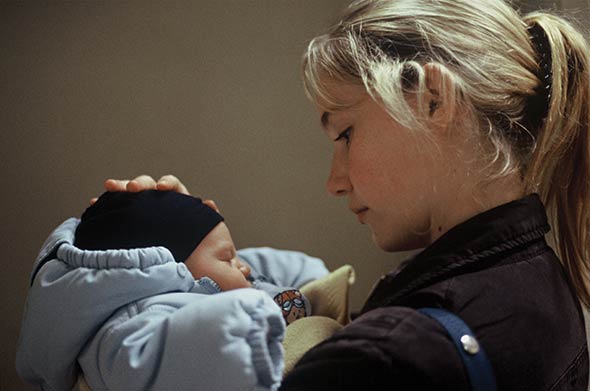
Text by Hannah Eves
It’s a rare honor for a director to win multiple Palmes d’Or, the highest prize for a film competing at that grande dame of foreign film celebrity, the Cannes Film Festival. Yet after winning with 1999’s Rosetta, Belgian brothers Luc and Jean-Pierre Dardenne joined a list of film luminaries (including Francis Ford Coppola and Emir Kusturica) when they accepted their second Palme d’Or for L’Enfant last year. It’s a rather extravagant award history for the pair of brothers who excel in making very small films about basic moral decisions. It is especially interesting to see their victory in the light of the previous winner, Fahrenheit 9/11 – both are concerned with the working class, but little L’Enfant is as real, if not more so, than the big documentary preceding it.
The Dardennes came to narrative filmmaking from long-established careers as documentary partners, and in the transition they brought with them the social concerns of their past work, much of which focused on the struggles of Belgium’s blue-collar class. That feeling remains: the narrative films have very little or no music and their longtime cinematographer Alain Marcoen renders their handheld world – usually the Dardennes’ depressed industrial hometown of Seraing – in the bland, worn-out shades of reality.
“We met a lot of people through our documentaries who gave us ideas and also ways to better understand the working class,” says Jean-Pierre Dardenne over the telephone from Belgium. “Keeping up relationships with them, I have seen industries closing and people losing their jobs. None of our characters are actual people we’ve met, but everybody is, in a way, similar to Bruno.”
Bruno (Jérémie Renier) is both the protagonist of L’Enfant and metaphorically its titular child. But he is also a father and it is his relationship with his newborn son Jimmy and Jimmy’s mother Sonia (Déborah François) that drives the film. The first thing we learn about Bruno is that he has sublet Sonia’s apartment for a few days without telling her while she’s giving birth in the hospital. She arrives home, babe in arms, to find other people in her apartment and Bruno out thieving. Bruno’s pattern of irresponsible behavior causes the horrible and thoughtless misdeed that brings about moral crisis and his eventual turn towards redemption.
L’Enfant, like the Dardennes’ other recent films (La Promesse, Rosetta, Le Fils), is a contemporary fable. Instead of operating under the Syd Field model of using a character-driven story arc, the Dardennes hark back to a time when moral lessons drove storytelling. Their protagonists are inevitably faced with a moment of decision: Will they do the “right” thing? As soon as this decision is made, the film suddenly stops and the credits start rolling. While contemporary storytelling often chooses to cloud this issue in a complex fog of “ifs” and “buts,” the characters in the Dardenneian world make it clear that, despite the worst of role models and environments, people are still capable of rising to the level of their consciences.
When asked about the morality of his films, Dardenne responds with one of those untranslatable French verbal shrugs. “At the beginning of the movies the characters are lonely. They discover, later on, that they are not by themselves and they exist through the eyes of other people,” he says. “We try really hard to make movies that are realistic but at the same time are something different and alive, and for the spectator to have a human experience when he is watching the movie. And afterwards, hopefully, he is going to have a human experience with other people.”
The Dardennes often site Robert Bresson as an influence and, like Bresson, they use many nonprofessional actors. “For the smaller roles it’s either people who act in the local theater in Belgium, people we have met through friends, or just people we’ve met who correspond well with the role. We rehearse with the nonprofessional actors for a whole month before the shoot. It’s not truly directing them – we use what they are. That doesn’t mean that we let them do anything that they like, but we steal a lot of things from them.
“There is a double interest for professional and nonprofessional actors to work together,” he adds. “The professional actors get to work with someone who doesn’t hide behind technique. It helps the professionals to work with the nonprofessionals because they can see then how the camera is attracted to innocence.”
While a fraternal bond has fueled their working lives, Dardenne agrees that their films often return to paternal relationships. “There were stories about the relationship between parents and children in the Bible. It’s the story of humanity.”

